
79 minute read
SPECIAL PROGRAM: (War on) Drugs, Social Movements, and Liberation
(WAR ON) DRUGS, SOCIAL MOVEMENTS, AND LIBERATION
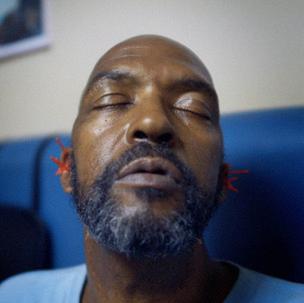
WAR ON DRUGS

BY VANCOUVER AREA NETWORK OF DRUG USERS (VANDU) BOARD OF DIRECTORS

Originally drafted in 2020
THE WAR In the last four years, we’ve seen a lot of casualties in ON DRUGS the war on our community . IS A WAR Deaths from overdose have shot through the roof as ON US. public health measures have failed to keep pace with shifts in a ruthless, highly profitable and rapidly changing drug market that remains criminalized . Compounded to this are deaths from pneumonia, from exposure, from falling, from liver failure, from all the sources of premature death that are made to disproportionately affect poor and oppressed people . . .
For us, deaths from overdose are not separate from these other causes of death . They are our neighbours, siblings, aunties, spouses, children and friends . They leave a gaping hole in our community—a silence filled with names and faces that haunt our lives .
For us, the war on drugs isn’t separate from the other wars waged on our community . It’s not separate from the war on the poor . It’s not separate from the 500-year war on Indigenous and colonized peoples . It’s not separate from the war on Black people and the plunder of Africa . It’s not separate from class war .
THE WAR In selecting the films for this program, VANDU wantON DRUGS IS A WAR ON US. ed to show films that represent us as we are: not as poor, downtrodden victims of drugs and addiction, but as a community—sometimes a community of survival, but also sometimes as a chosen family and a community of interest . People struggling to survive and people fighting back .
THE WAR ON DRUGS IS A WAR ON US.
We wanted to select films that would raise important questions, not only about our oppression, but about our liberation:
• How do drug users organize and fight back against the drug war? • How are drug user movements woven into other movements of poor and oppressed peoples? • What does liberation look like for people who use drugs?
The films selected demonstrate how the war on drugs is a global war on poor and oppressed peoples . They document how addiction and drug use cannot be policed, prisoned, health-cared or social-serviced away, but must instead be addressed by social movements seeking to transform oppressive systems from below . Finally, they prove that only the leadership of organizations by people who use drugs can determine the path towards our own liberation . Nothing about us, without us .
Since President Rodrigo Duterte’s election in 2016, the Philippines has become a frontline in the global war on drugs . Alyx Ayn Arumpac’s film Aswang (2019) crawls through Manila’s urban poor communities, exposing those who profit from the war on drugs and those who pay the price . It’s a film where the villain never shows its face, documenting a country that has become one of the most dangerous places in the world for drug users, trade unionists, human rights defenders and, notably, journalists . Arumpac’s document of Duterte’s crimes is an act of courage and resistance . It is a platform for the voices of the poor in their despair and desperation—and in their anger . It also offers glimpses of powerful resistance from our comrades in KADAMAY, RISE UP and the people’s mass movement in the Philippines .
“WHAT DOES LIBERATION Mia Donovan’s Dope is Death (2020) grapples with the real problems that addiction and problematic drug use pose in LOOK LIKE poor and oppressed communities, and how FOR PEOPLE movements and institutions invested in the health and self-liberation of individuals WHO USE might address these issues . It revisits the DRUGS? ” Black Panther Party and Young Lords’ Lincoln Detox centre, which combined peer support, political education and community-led health care as an alternative to police, prisons, social workers, child ‘protection’ services, coerced treatments and other conventional responses to addiction . Dope is Death surveys the social relations of addiction, resistance, mutual aid, self-determination and state repression, and binds them in a narrative that reveals a twisting path toward liberation .
Nettie Wild’s FIX: The Story of an Addicted City (2002) is a document of VANDU’s history . The radical organization of people who use drugs in the Downtown Eastside, and our struggle for the basic dignity of appropriate health care in the form of a supervised injection site, changed our neighbourhood and—just as importantly—changed the expectations and aspirations of people who use drugs in our community . FIX is a snapshot of a moment of mobilization and resistance built on the painstaking work of grassroots organizing, community-building and democratic processes that have characterized VANDU over its 20-year history .
POSTSCRIPT FOR 2021

Dedicated to the memory of Ron Kuhlke, VANDU, WAHRS, and EIDGE Leader
The plague year spelled death for drug users and the Downtown Eastside, with infection being the least of our troubles . A recorded 1,716 lives were taken by the drug war in BC in 2020, representing 4 .7 deaths a day—a 74% increase over 2019 . Organized state abandonment, revanchist policing and forced containment in so-called ‘supportive housing’ suffocated our community as the rest of the city fortified their condo enclaves .
In spite of the carnage wrought upon us, we continue to organize and survive .
Kímmapiiyipitssini: The Meaning of Empathy (2021) depicts the various forms of community and state response to the fentanyl crisis in the Blood 148 reserve in Alberta . Users and their families navigate the complex and often conflicting systems of traditional Indigenous leadership and settler government as fentanyl rips through the rez . As an organization with a considerable Native membership, VANDU has long recognized the importance of centering Indigenous elders and the passing on of knowledge and mentorship to combat the continued genocide of young users . The Western Aboriginal Harm Reduction Society (WAHRS), founded by VANDU members, welcomes Native users who arrive from the reserves . Much like the story of Blood 148, the fight for basic harm reduction outside coastal city centres is still far from over .
One highlight of the film is its focus on illicit alcohol drinkers, a group often marginalized in the drug user movement despite evidence that nearly a third of all victims of overdose are found with alcohol in their systems . In 2012, VANDU leaders formed a caravan to meet and organize with alcohol users across the province . Learning from their struggle, we formed the Eastside Illicit Drinkers Group for Education (EIDGE) . To this day, EIDGE continues to combat poison supply and criminalization, in part through the development of community-led Managed Alcohol Programs (MAPs) .
VANDU’s activism has had a long arc . As of late 2020, municipal and federal actors have at last committed to decriminalizing possession (though they are, unsurprisingly, dragging their feet on the issue), and harm reduction culture is becoming normalized across the country . But as our survival practices become institutionalized—and become an industry (a highly profitable one at that)— we must remember our radical roots . VANDU is a movement organization . In presenting Elle-Máijá Tailfeathers’s Kímmapiiyipitssini, we extend solidarity to our brothers and sisters throughout Turtle Island, not just to those struggling for the liberation of drug users, but also for the sovereignty of Indigenous nations and the survival and flourishing of poor peoples everywhere .
VANDU Board of Directors
1.VIFF’S VANCITY THEATRE
1.VIFF’S VANCITY THEATRE 1181 Seymour St (@ Davie St) 1181 Seymour St (@ Davie St) 1.VIFF’S VANCITY THEATRE 2.THE CINEMATHEQUE 1181 Seymour St (@ Davie St) 2.THE CINEMATHEQUE 1131 Howe St (@ Helmcken St) 1131 Howe St (@ Helmcken St) 2.THE CINEMATHEQUE 3.SFU’S GOLDCORP CENTRE FOR THE ARTS 1131 Howe St (@ Helmcken St) 3.SFU’S GOLDCORP CENTRE FOR THE ARTS 149 W Hastings St (@ Abbott St) 149 W Hastings St (@ Abbott St) 3.SFU’S GOLDCORP CENTRE FOR THE ARTS 4.THE PLAYHOUSE149 W Hastings St (@ Abbott St) 4.THE PLAYHOUSE 600 Hamilton St (@ Dunsmir St) 600 Hamilton St (@ Dunsmir St)4.THE PLAYHOUSE 5.MUSEUM OF VANCOUVER 600 Hamilton St (@ Dunsmir St) 5.MUSEUM OF VANCOUVER 1100 Chestnut St 1100 Chestnut St 5.MUSEUM OF VANCOUVER 6.THE POST AT750 1100 Chestnut St 6.THE POST AT750 750 Hamilton St (@ Robson) 750 Hamilton St (@ Robson)6.THE POST AT750 7.VANCOUVER PUBLIC LIBRARY 750 Hamilton St (@ Robson) 7.VANCOUVER PUBLIC LIBRARY 350 W Georgia Street 350 W Georgia Street 7.VANCOUVER PUBLIC LIBRARY 350 W Georgia Street

CHESTNUTCHESTNUTCHESTNUT
WHYTE WHYTE WHYTE BURRARD BURRARD BURRARD
WATERFRONT WATERFRONT STATION STATION WATERFRONT STATION
SEYMOUR HOWE GRANVILLESEYMOUR HOWE GRANVILLE SEYMOUR HOWE GRANVILLE DAVIE NELSON HELMCKEN SMITHE HAMILTON DAVIE NELSON HELMCKEN SMITHE HAMILTON DAVIE NELSON HELMCKEN SMITHE HAMILTON ROBSON CAMBIE HASTINGSPENDER CORDOVA VICTORY SQUAREGEORGIADUNSMUIR ROBSON CAMBIE HASTINGSPENDER CORDOVA VICTORY SQUAREGEORGIADUNSMUIR ROBSON CAMBIE HASTINGSPENDER CORDOVA VICTORY SQUAREGEORGIADUNSMUIR
DOXA DOXA OFFICE OFFICE DOXA OFFICE
BC PLACE BC PLACE BC PLACE
ABBOTTABBOTTABBOTT
M A P O F V E N U E S M A P O F V E N U E S M A P O F V E N U E S
LOVE WHAT YOU'RE SEEING? BECOME A DOXA DONOR TODAY! To make a one-time or monthly donation now, visit www.doxafestival.ca/donate. It's quick and easy (we promise)! Prefer a paper form? Please complete the sheet below! NAME ____________________________________________________________________________________________________ A ADDRESS ________________________________________________________________________________________________ C CITY ____________________________________________________________________________ P PROV _________________ POSTAL CODE ___________________________________ PHONE # # ___________________________________________ EMAIL ____________________________________________________________________________________________________ Receive DOXA's Newsletter? o YES o No, thanks . . . . . . . . . . . . . . . . . . . . . . . . . . . . . . Y e s , I w o u l d l i k e t o s u p p o r t D O X A w i t h a M O N T H L Y c o n t r i b u t i o n o f : o $15 / month o $65 / month o $25 / month o $85 / month o $45 / month o $100 / month Y e s , I w o u l d l i k e t o s u p p o r t D O X A w i t h a O N E - T I M E c o n t r i b u t i o n o f : o $20 o $50 o $80 o Please direct my donation to the 20th ANNIVERSARY FUND. o Please direct my donation to the HOLDSTOCK FUND for filmmaker travel. o I would like my donation to remain anonymous. o I would like to receive donor benefits (see doxafestival.ca/donate for more details). I would like to make my donation: o In honour of _____________________________________________________ . . . . . . . . . . . . . . . . . . . . . . . . . . . . . . NAME ON CREDIT CARD ____________________________________________________________________________ CREDIT CARD # _______________________________________________________________________________________ EXPIRY (MM/YY): _______________________________________________________________ CVV: ______________ # $100 o $500 o $ ___________ o In memory of ____________________________________________________ LOVE WHAT YOU'RE SEEING? B BECOME A DOXA DONOR TODAY! To make a one-time or monthly donation now, visit www.doxafestival.ca/donate. It's quick and easy (we promise)! Prefer a paper form? Please complete the sheet below! NAME ____________________________________________________________________________________________________ ADDRESS ________________________________________________________________________________________________ CITY ____________________________________________________________________________ PROV _________________ POSTAL CODE ___________________________________ PHONE # ___________________________________________ EMAIL ____________________________________________________________________________________________________ Receive DOXA's Newsletter? o YES o No, thanks . . . . . . . . . . . . . . . . . . . . . . . . . . . . . . Y e s , I w o u l d l i k e t o s u p p o r t D O X A w i t h a M O N T H L Y c o n t r i b u t i o n o f : o $15 / month o $65 / month o $25 / month o $85 / month o $45 / month o $100 / month Y e s , I w o u l d l i k e t o s u p p o r t D O X A w i t h a O N E - T I M E c o n t r i b u t i o n o f : o $20 o o $50 o $80 o Please direct my donation to the 20th ANNIVERSARY FUND. o Please direct my donation to the HOLDSTOCK FUND for filmmaker travel. o I would like my donation to remain anonymous. o I would like to receive donor benefits (see doxafestival.ca/donate for more details). I would like to make my donation: o In honour of _____________________________________________________ . . . . . . . . . . . . . . . . . . . . . . . . . . . . . . NAME ON CREDIT CARD ____________________________________________________________________________ CREDIT CARD # _______________________________________________________________________________________ EXPIRY (MM/YY): _______________________________________________________________ CVV: ______________ # $100 o $500 o $ ___________ QUESTIONS? Contact DOXA Development & Communications Manager Sarah Bakke: sarah@ doxafestival.ca / 604.646.3200 x104 CHARITY NUMBER: 854305331RR0001 o In memory of ____________________________________________________ LOVE WHAT YOU'RE SEEING? BECOME A DOXA DONOR TODAY! To make a one-time or monthly donation now, visit www.doxafestival.ca/donate. It's quick and easy (we promise)! Prefer a paper form? Please complete the sheet below! NAME ____________________________________________________________________________________________________ ADDRESS ________________________________________________________________________________________________ CITY ____________________________________________________________________________ PROV _________________ POSTAL CODE ___________________________________ PHONE # ___________________________________________ EMAIL ____________________________________________________________________________________________________ Receive DOXA's Newsletter? o YES o No, thanks . . . . . . . . . . . . . . . . . . . . . . . . . . . . . . Y e s , I w o u l d l i k e t o s u p p o r t D O X A w i t h a M O N T H L Y c o n t r i b u t i o n o f : o $15 / month o $65 / month o $25 / month o $85 / month o $45 / month o $100 / month Y e s , I w o u l d l i k e t o s u p p o r t D O X A w i t h a O N E - T I M E c o n t r i b u t i o n o f : o o $20 o o $50 o $80 o Please direct my donation to the 20th ANNIVERSARY FUND. o Please direct my donation to the HOLDSTOCK FUND for filmmaker travel. o I would like my donation to remain anonymous. o I would like to receive donor benefits (see doxafestival.ca/donate for more details). I would like to make my donation: o In honour of _____________________________________________________ . . . . . . . . . . . . . . . . . . . . . . . . . . . . . . NAME ON CREDIT CARD ____________________________________________________________________________ CREDIT CARD # _______________________________________________________________________________________ EXPIRY (MM/YY): _______________________________________________________________ CVV: ______________ # $100 o $500 o $ ___________ o In memory of ____________________________________________________ QUESTIONS? Contact DOXA Development & Communications Manager Sarah Bakke: sarah@ doxafestival.ca / 604.646.3200 x104 CHARITY NUMBER: 854305331RR0001 QUESTIONS? Contact DOXA Development & Communications Manager Sarah Bakke: s sarah@ doxafestival.ca / 604.646.3200 x104 CHARITY NUMBER: 854305331RR0001

Proud major media partner of DOXA Proud major media partner of DOXA createastir.ca createastir.ca
JUSTICE FORUM LIVE Q&A DOXA DRIVE-IN

The Gig is Up
Shannon Walsh, Canada, 2021, 89 mins
“If done the right way, these kinds of opportunities can literally change lives .” So says tech entrepreneur Prayah Narula of gig labour, a growing phenomenon and employment path that promises flexible hours, independence and open recruitment to workers around the world . From delivering food, to transporting passengers, to tagging images online, millions of people—including those who might otherwise be unable to find work in more conventional environments—are being drawn to gig employment, task by task, for the chance to do any job that pays .
Despite its utopian potential, the reality of the gig economy is something far less auspicious . Work conditions are frequently dangerous, pay often fluctuates without notice, and workers can effectively be fired at the push of a button . In The Gig is Up, Vancouver-based director Shannon Walsh offers an unflinching look at the impact gig work is having around the world . Spanning global networks from rural Florida to Lagos, Nigeria (with many ride shares and food services in between), gig workers of all backgrounds share their stories through candid interviews, while tech experts and academics provide critical commentary on an industry now worth over 5 trillion USD—and growing . As the global pandemic rages on and our collective reliance on online shopping and delivery services becomes increasingly a part of daily life, it’s more important than ever to reflect on the labour that goes unseen . Derek Thompson of The Atlantic has described the emergence of app-based utilities like Uber as “convenience maximalism,” which begs the question: What does life look like for the people providing these services? DOXA is proud to open our 20th annual festival with this courageous film that reveals how the magic of today’s technology and its selling points might not be magical at all, and that asks us to consider the true cost of convenience .
THIS IS PART OF JUSTICE FORUM AND WILL INCLUDE A POST-FILM DISCUSSION. READ MORE ON PAGE 24.

WAR ON DRUGS JUSTICE FORUM LIVE Q&A DOXA DRIVE-IN

Kímmapiiyipitssini: The Meaning of Empathy
Elle-Máijá Tailfeathers, Canada, 2021, 125 mins
Kímmapiiyipitssini: The Meaning of Empathy puts humanity and compassion first in its engagement with the substance-use crisis and drug-poisoning epidemic on the Kainai First Nation in southern Alberta . Filmmaker Elle-Máijá Tailfeathers (The Body Remembers When the World Broke Open) invites viewers to witness the collective work of her community as it faces radical transformation . Surrounded by tall prairie grass gently swaying in the wind, Dr . Esther Tailfeathers, a family doctor, community harm-reduction advocate, and Elle-Máijá’s mother, stands strong . She embraces the Blackfoot teaching of Kímmapiiyipitssini: “Kímmapiiyipitssini means compassion…” she says . “In our way of believing, if you help people out then you are blessed to continue to do that, and so our People are supposed to give what they have or what they can to help . ”
Set among the flowing foothills and vast skies of southern Alberta, Kímmapiiyipitssini: The Meaning of Empathy draws a connecting line between the impacts of colonialism on Blackfoot land and people, and the ongoing substance-use crisis . With extraordinary care and consideration, Tailfeathers masterfully weaves together multiple stories of hope and resilience . First responders, medical professionals and community members whose lives have been affected by addiction and recovery offer intimate and urgent perspectives while implementing harm reduction in order to save lives . By questioning abstinence-only treatment, and showing the lives that have been saved through harm reduction models, the film asks the audience to take part in and commit to the Kainai First Nation’s methods of urgent change .
A must-see for all citizens (but policy makers and health professionals may want to take special note), Kímmapiiyipitssini charts a road map towards healing . Against the backdrop of Vancouver’s own ongoing drug-poisoning epidemic, Kímmapiiyipitssini: The Meaning of Empathy is perhaps one of the most urgent and critical films of this year .
THIS IS PART OF JUSTICE FORUM AND WILL INCLUDE A POST-FILM DISCUSSION. READ MORE ON PAGE 24.
THIS FILM IS PART OF THE WAR ON DRUGS PROGRAM. MORE ON PAGE 34.
RATED Y FOR YOUTH LIVE Q&A
DOXA DRIVE-IN

Someone Like Me
Sean Horlor and Steve J. Adams, Canada, 2021, 80 mins
Drake, a vibrant 22-year-old gay man from Uganda, leaves behind everything he knows in order to be who he is and love whomever he chooses without fear of discrimination, persecution or violence—a freedom that everyone deserves .
Tasked with a year-long commitment as Drake’s primary support network, a group of strangers from Vancouver’s queer community unite under the banner of Rainbow Refugee, a non-profit that connects LGBTQ+ asylum claimants with sponsors . In the months following Drake’s arrival from Uganda, facets of his turbulent experiences and day-to-day challenges begin to parallel those of certain group members: Marlon also moved cities in order to live his life openly as a gay Black man; David struggles to find job security after grad school; and Kay’s gender transition presents a long and emotional road to personal freedom . As problems are compounded by the COVID-19 pandemic, the group must ask themselves difficult questions about their capacity, their commitment, and the conditions of support . A substantive amount of the work includes meeting Drake’s immediate basic needs, but sustaining the necessary emotional and psychological assistance and mentorship over the next 12 months becomes the most delicate task .
Vancouver-based directors Sean Horlor and Steve J . Adams’s feature documentary Someone Like Me takes a verité approach to the generous and rough-edged nuances of what it means to sponsor an asylum seeker . Chronicling the complexities of the journey taken by Drake and his sponsors, the filmmakers illuminate how survival itself becomes a victory in a world where one must constantly fight for the right to exist .
THIS IS PART OF RATED Y FOR YOUTH AND WILL INCLUDE A POST-FILM DISCUSSION. READ MORE ON PAGE 25.
CANADIAN FILMS
telefilm.ca/en/seeitall
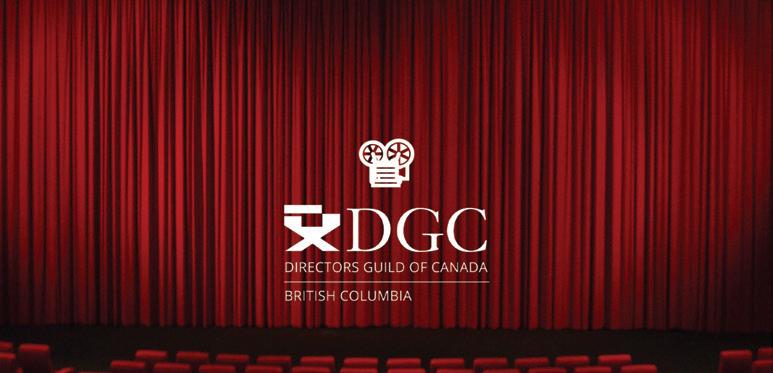

DOXA DRIVE-IN

Poly Styrene: I Am A Cliché
Paul Sng and Celeste Bell, UK, 2021, 89 mins
Poly Styrene was the first Black woman in the UK to front a successful rock band . She introduced the world to a new sound of rebellion, using her unconventional voice to sing about identity, consumerism, postmodernism, and everything she saw unfolding in late 1970s Britain, with a rare prescience . As the frontwoman of X-Ray Spex, the Anglo-Somali musician was also a key inspiration for the riot grrrl and Afropunk movements . But the late punk maverick didn’t just leave behind an influential cultural footprint; she is survived by a daughter, Celeste Bell, who became the unwitting guardian of both her mother’s legacy and her demons . Misogyny, racism and mental illness plagued Poly’s life, while the lasting trauma scarred Celeste’s childhood and the pair’s relationship . Featuring unseen archival material and rare diary entries narrated by Oscar-nominee Ruth Negga, this film follows Celeste as she examines her mother’s unopened artistic archive, and travels across three continents to better understand Poly the icon and Poly the mother . “Testimonials from the Raincoats, Thurston Moore, Vivienne Westwood, Kathleen Hanna and Neneh Cherry… and an abundance of vintage footage make clear the appeal and impact of Styrene’s brightly blazing artistry. But it’s the documentary’s refusal to gloss over the bumpier parts of her life – or fall into the tired trope of the tortured genius whose artistry excuses any missteps – while still treating Styrene with love and admiration that ensures I Am A Cliché is anything but.” - BILLBOARD MAGAZINE


Aalto
Virpi Suutari, Finland, 2020, 103 mins
Considered by many as one of the greatest architects of the 20th century, Alvar Aalto enjoyed an exceptionally rich career both at home in Finland and abroad . His blend of beauty and functionalism, attention to material details and human-centred approach to design had a profound impact on the trajectory of modernism . Aalto offers a stunning cinematic tour of some of his most celebrated projects: from the ground-breaking Paimio Sanatorium in Finland and the Vyborg Library in Russia, to the MIT Baker House Dormitory in Massachusetts and the Finnish Pavilion at the Venice Biennale . But director Virpi Suutari (Garden Lovers, DOXA 2014) challenges the myth of the lone creative genius by highlighting how indebted Aalto’s legacy is to his wife Aino Aalto, an architect, interior designer and managing director of their company, Artek . Through interviews with experts, home videos and letters exchanged between Alvar and Aino, Aalto provides insight into the couple’s intimate life, their joint creative endeavours and their iconic contributions to modernist design . -MS
PRECEDED BY THE SHORT FILM
Sacred Brick Technology (p . 86)
TRIPLE PLATINUM
Afghan Girls Can Kick
Bahareh Hosseini, Afghanistan, 2008, 50 mins
When the Taliban took power, men tried to outlaw Afghan women’s basic liberties entirely, forcing them to go through life veiled, usually indoors, excluded from education, employment and sports . Afghan Girls Can Kick follows a group of teenagers who rebelled against great opposition to secure themselves the opportunity to play football . Battling both poverty and sexism, the film shows how these women were able to overcome powerful resistance and ultimately establish Afghanistan’s first national women’s football team, gaining power and purpose in the process . The film follows the team in the aftermath of an invitation to play in Pakistan—their first international match—focusing on trip preparations and a few individual players such as Roya, who collected paper on the streets of Kabul until an organization sent her to school and discovered her huge football talent . Hosseini’s film offers rare insight into the lives of these fun-loving, athletic women—not victims, but women fighting for their future . -KA


The Arrow and the Uniform
Miguel Antunes Ramos, Brazil, 2020, 86 mins
In 2013, four rolls of film were found at the Indigenous Museum in Rio de Janeiro . The footage features the 1970 graduation of the Indigenous Rural Guard, Brazil’s first and only Indigenous battalion . Created at the height of repression under Brazilian military dictatorship, the militia’s graduation consisted of 97 Indigenous people, clad in uniform and gesturing like the country’s police .
Today, more than 30 years after the end of Brazillian dictatorship, viewing these images causes a kind of vertigo, and it is this vertigo that is at the heart of Miguel Antunes Ramos’s film . In its search for these guards—their bodies, their histories and their memories—The Arrow and the Uniform is also an exploration of the fractures, the silences, the remains and the sustained losses in the violence of Brazillian history .
WAR ON DRUGS
Aswang
Alyx Ayn Arumpac, Philippines, 2019, 85 mins
In modern day Manila, citizens are dying every day, their deaths a consequence of President Rodrigo Duterte’s pledge to end drug trafficking in the Philippines at any cost . This remorseless promise has set off a wave of extrajudicial killings since Duterte’s election in 2016—more than 20,000 men, women and children were killed in Duterte’s first two years alone .
Alyx Ayn Arumpac’s film reframes the horrors of Duterte’s war on drugs through the myth of the Aswang—a shapeshifter common in Filipino folklore that preys on humans, brutally and senselessly . The film brings the creature to life, surveying the carnage left in its wake: a worker sweeps blood down the street; a six-year-old boy fends for himself while his mother sits in jail; funeral homes fill with corpses . Traveling through neighborhoods and revealing the cruelty and corruption of drug enforcement police, Aswang explores the devastating toll the drug war has taken in Manila . To those who have lost their loved ones and suffered under Duterte’s bloodshed, the Aswang is everywhere .
virtual edition
Édition VIRTUELLE




RATED Y FOR YOUTH

The Big Scary “S” Word
Yael Bridge, US, 2020, 82 mins
How do you define socialism? For Americans, the mere mention of the word is enough to send many either scurrying from the conversation, or baring their teeth in distrust . For those willing to talk about it, opinions range from socialism as the ultimate expression of democracy to the end of society as we know it . Filmmaker Yael Bridge’s heady mix of history, cautionary tale and optimistic road map takes us on a tour of American socialism from early idealistic communes in Wisconsin to the work of a current Virginia legislator (and part-time Lyft driver)—the lone representative of his ideology in his state congress . In addition to some of the intellectual Left’s major stars (Cornel West, Naomi Klein, Eric Foner), we hear from regular folks, including an Oklahoma school teacher turning “radical” before our eyes . Energetically packed with compelling evidence and insightful observations, The Big Scary “S” Word is edu-tainment for the political soul . -TA

The Black Panthers: Vanguard of the Revolution
Stanley Nelson, US, 2015, 115 mins
In The Black Panthers: Vanguard of the Revolution, Nelson (Freedom Rider and Freedom Summer, both of which screened at DOXA) puts his masterful research skills to work to closely examine the politics and history of the revolutionary organization known as The Black Panther Party . In the wake of the Civil Rights Movement police brutality continued unabated, and the Panthers were determined to fight back . Stunning footage of demonstrations and back room meetings are brought to life by candid interviews with the folks who were on the front lines . Party leaders including Eldridge Cleaver, Bobby Seale and Huey Newton are given due coverage, but even more fascinating are the lesser-known programs that the Panthers initiated, such as the “survival” food program . Fearless not only in challenging white supremacy, but also in attacking capitalism and demanding better housing and education, the Panthers actively advocated for social change . Passive resistance was not on the table . As violence in the US reaches new levels and the racial divide continues to wreak havoc on the American psyche, this film could not be more necessary . -SC
THIS ENCORE SCREENING IS PART OF A SPECIAL INDUSTRY EVENT. MORE ON PAGE 18.


Cane Fire
Anthony Banua-Simon, US, 2020, 90 mins
The Hawaiian island of Kaua’i is seen as a paradise of leisure and pristine natural beauty, but these escapist fantasies obscure the colonial displacement, hyper-exploitation of workers, and destructive environmental extraction that have actually shaped life on the island for the last 250 years . Cane Fire critically examines the island’s history—and the various strategies by which Hollywood has represented it—through four generations of director Anthony Banua-Simon’s family, who first immigrated to Kaua’i from the Phillipines to work on the sugar plantations . Assembled from a diverse array of sources—from Banua-Simon’s observational footage, to amateur YouTube travelogues, to epic Hollywood dance sequences— Cane Fire offers a kaleidoscopic portrait of the economic and cultural forces that have cast Indigenous and working-class residents as “extras” in their own story .
DOXA DRIVE-IN
Dead Man’s Switch: a crypto mystery
Sheona McDonald, Canada, 2021, 78 mins
The 2018 death of Gerald Cotten, CEO of Canada’s largest Bitcoin exchange, reads like something out of a paperback mystery . When Cotten died suddenly in India at age 30, he took with him the secret to accessing $215 million in cryptocurrency, setting off a mad search by reporters, regulators and former customers for the missing funds . What they uncovered only raised more questions, including the biggest one of all: Did Gerald Cotten really die, or did he fake his death and walk away with all the money?
In the hands of filmmaker Sheona McDonald—who DOXA audiences may remember from her 2019 film Candice, a profile of feminist pornographer Candice Vadala—Cotten’s story becomes a fast-paced, gripping thriller . McDonald is methodical in her reporting, exploring every theory and chasing down every lead . The journey takes us from a crypto club in Victoria, to one of Cotten’s bankrupted former customers in San Francisco, to a doctor in India who might just have all the answers . -JM


Dear Elnaz
Mania Akbari, Canada/Iran/UK, 2020, 85 mins
In a study hall at the University of Alberta, Javad texts his wife Elnaz as she prepares to board Ukranian Airlines flight PS752 back to Canada after visiting her family in Iran . It’s their final communication, and Elnaz never arrives home .
Elnaz was one of 176 passengers aboard the passenger plane shot down by the Islamic Revolutionary Guard Corps of Iran on January 8, 2020 . In the aftermath of this event, Javad and a tight-knit crew of Iranian students studying in Edmonton banded together, and Dear Elnaz chronicles the grief and rage they experienced over the tragedy, and the solace they found within their community . “It hit all of us . . . I became unsafe with you,” a friend tells Javad, whose pain is shown unvarnished as he revisits the places he and Elnaz would spend their time together . From the other end of the world, Javad channels his anguish into a cry for justice, calling on the Iranian regime to finally be held accountable . -CN
SELF STUDY
Delphine’s Prayers
Rosine Mbakam, Belgium/Cameroon, 2021, 91 mins
In a cluttered bedsit in Belgium, 30-year-old Delphine pours out the story of her life to her friend, and filmmaker, Rosine . Over a series of carefully composed recording sessions, Delphine discloses the details of her harsh childhood in Cameroon, the series of events that led her to pregnancy and homelessness at 13, and her career as a sex worker . A loveless marriage did not lead to a better life in Europe as she had hoped, and racism and patriarchy have remained barriers between her and her dreams as she navigates life in a new country where she is routinely reduced to her gender and skin colour . Told on her own terms, Delphine’s narrative is both dramatic and matter-of-fact . “Nobody will stop this story from being told, as long as I’m the pilot of this plane .” A fellow Cameroonian émigré, Rosine Mbakam’s intimate documentary gives veracity to Delphine’s defiant statement and allows us to bear tender witness to her testimony . -TA

WAR ON DRUGS

Dope is Death
Mia Donovan, Canada, 2020, 78 mins
In 1970, community activists in NYC were fed up with the city’s lack of response to the growing heroin epidemic . So, with help from the Black Panthers and Young Lords, they came up with their own solution—the Lincoln Detox clinic . Radical politics were at the core of the organization, but first and foremost it offered local folks a safe place to detoxify and work together in outpatient programs . Under the eventual leadership of Dr . Mutulu Shakur (stepfather of Tupac Shakur), the Lincoln clinic grew to embrace the practice of acupuncture as a major part of its grassroots, community-based approach to addiction treatment . Extensive archival footage, deftly presented by filmmaker Mia Donovan, shows how the effects of the organization’s radical approach to health are still felt today . Donovan and the subjects of her film demonstrate how activism and healthcare can intersect in collective healing . -CP
DOXA DRIVE-IN
FANNY: The Right to Rock
Bobbi Jo Hart, Canada, 2021, 92 mins
“The conversation about women’s place is right smack dab in the middle of rock ‘n’ roll .” —Fanny drummer, Alice de Buhr
Hard rock was on the rise in the late 60s, and Fanny, a group founded by Filipina-American sisters in California, impressed everyone with their heavy beats and blistering musical chops . They possessed musicianship, ambition and a major label record deal . So why did they end up on so many lists of the “best forgotten bands,” including that of David Bowie? FANNY: The Right to Rock tells the story of a 70s rock band like no other—all-female, Asian-American, with LGBTQ+ members—who struggled to overcome the limitations of an industry and a society hellbent on painting them into a hyper-sexualized corner . Filmmaker Bobbi Jo Hart pulls the action into the present day and follows the women of Fanny as they confront aging and ageism, and inspire new generations of musicians . -TA

NORTH AMERICAN PREMIERE SELF STUDY FRENCH FRENCH
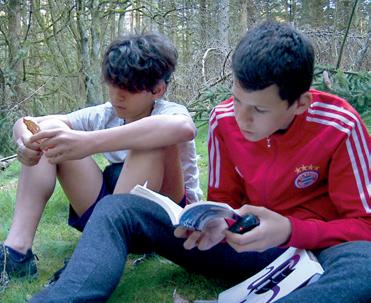
Far From You I Grew (Loin de vous j’ai grandi)
Marie Dumora, France/Switzerland, 2020, 102 mins
Fifteen-year-old Nicolas is at a crossroads: stay at his foster home and school where he has friends and the possibility of real opportunities, or return to his birth home with his stepdad, mother and three younger siblings, hoping for familial love and rebonding . That’s a lot to have on your plate and at so young an age .
Director Marie Dumora (who featured Nicolas’s mom Sabrina in her film Belinda, which screened at DOXA in 2018) presents a nonlinear narrative: we see Nicolas as a baby, as a foster boy reaching for enrichment, and as a taciturn teenager trying to fit in during his sporadic visits home . He appears to open up more so at his foster home, where he reads, spends time with friends and views the stars when visiting an elderly neighbour . Dumora paints a portrait of a young man who hopes to find his best path despite the many changes that hang in the balance . -JM
SELF STUDY
Father
Deng Wei, China, 2020, 96 mins
Filmmaker Deng Wei’s grandfather Zuogui has been blind since the age of three, living most of his life as a fortune teller and raising many children . Now approaching the final chapter of his life, Zuogui lives a life of bitter discontent toward his son (and Wei’s father) Donggu, a businessman who is set on earning the respect not afforded him as a child . Donggu works as a property developer to provide his family with a good life, but when a job-site accident forces him into financial hardship, it prompts a re-examination of his priorities and values—one that may lead the father and son to finally form a bond of respect, perhaps even love . Set against the vast transformation and economic change within contemporary Chinese society, Wei’s quiet fly-on-the-wall cinematography captures the fraught relationship between his father and grandfather as they negotiate past resentments and an uncertain future . -KE

RATED Y FOR YOUTH

Firestarter - The Story of Bangarra
Wayne Blair and Nel Minchin, Australia, 2020, 97 mins
Marking Bangarra Dance Theatre’s 30th anniversary, Firestarter tells the story of how three young Aboriginal brothers—Stephen, David and Russell Page—took a newly born dance company and, alongside its founders and alumni, turned it into a First Nations cultural powerhouse .
But as Bangarra rose to the forefront as Australia’s premiere cultural ambassadors, so too did the brothers’ overwhelming sense of inherited trauma . “Bangara was in the business of reconciliation long before it became fashionable,” Stephen says . But at what cost? Profound tragedies have punctuated the strings of wide, critical acclaim more often than not, shaking the troupe to its core each time . Wayne Blair and Nel Minchin’s moving film explores the loss and reclamation of culture, the burdens of intergenerational trauma and—crucially—the power of art as a messenger for social change and healing .
SELF STUDY
The First Woman
Miguel Eek, Spain, 2020, 77 mins
Eva yearns to leave the psychiatric hospital that she’s called home for the past six years . Her greatest dream is to reconnect with her estranged son, whom she hasn’t seen for over a decade, but she fears he won’t forgive her for her past mistakes . After a long wait at the facility, punctuated by philosophical and often humorous conversations with other patients, Eva’s opportunity to leave finally arrives . Director Miguel Eek (City of the Dead, DOXA 2019) captures this moment of transition in Eva’s life with a keen eye for composition and an empathetic approach . The First Woman is a tender portrait that will challenge preconceptions about people living with mental illness . -MS

WAR ON DRUGS

FIX: The Story of an Addicted City
Nettie Wild, Canada, 2002, 92 mins
Nearly two decades after its release, director Nettie Wild’s account of the fight to establish North America’s first safe injection site remains just as vital as when it was first released . The film focuses on the unlikely partnership between Dean Wilson, a drug user and safety advocate, and Ann Livingston, a community organizer driven by her religious convictions . Together the pair rally drug users and other community members to advocate for reforms that will save lives .
It’s impossible to watch Wild’s film today without reflecting on how little has changed in the last 20 years . We see police using heavy-handed tactics to clear streets, critics employing negative stereotypes to denigrate drug users, and community activists struggling to do their best with limited resources . Many of these sequences feel like they could have been shot in 2021 . While the activists in FIX were able to win the day, their fight to ensure the safety of Vancouver’s drug users goes on . -JM
SELF STUDY
Fly So Far
Celina Escher, Sweden/El Salvador, 2021, 88 mins
Teodora Vásquez was sentenced to 30 years in prison for the “aggravated murder” of her child after she miscarried . While in prison in El Salvador, Teodora came to learn that she was not alone—at least 17 other women who had suffered stillbirths or other obstetric emergencies were also facing decades-long sentences under the country’s abortion laws . Fly So Far connects this injustice to a wider cultural devaluation of women: “When a woman becomes pregnant, she loses all her rights and automatically becomes an incubator,” explains one obstetrician . In telling Teodora’s story, the film explores the political, social and legal battles that play out as “The Seventeen” fight for their freedom in solidarity with each other and with feminists across the country . -NC

WORLD PREMIERE JUSTICE FORUM

Food for the Rest of Us
Caroline Cox, Canada, 2021, 84 mins
Across Turtle Island and beyond, young people are turning their anxieties into action when it comes to sustenance and the human relationship to food . Food for the Rest of Us follows four unique and inspiring food projects that are making a difference in their communities: a youth internship program in Hawaii offers college tuition in exchange for two years’ service on an organic farm; an urban farmer in Kansas City describes his aquaculture initiative as a form of decolonization; a female Shochet in rural Colorado conducts workshops reconnecting participants to a more humane and local meat supply chain; and a community greenhouse takes advantage of short, intense summers to grow fresh produce in the Northwest Territories where, despite the impending threat of climate change, Indigenous methods of food harvesting have continued to thrive . Centering their agricultural practices firmly in their belief that new ways of operating are crucial for our survival, these food activists demonstrate—through word and deed—alternative paths to our culinary future . -TA
RATED Y FOR YOUTH
Forest for the Trees
Rita Leistner, Canada, 2021, 91 mins
Award-winning war photographer Rita Leistner goes back to her roots as a tree planter in the wilderness of British Columbia, offering an inside take on the gruelling, sometimes fun and always life-changing experience of restoring our province’s forests . Leistner, who has photographed some of the world’s most dangerous places, credits the challenge of tree-planting for her physical endurance . In Forest for the Trees, her first feature film, she revisits her past to share the lessons she learned .
The film introduces us to everyday life on the “cut-block” and the brave souls who fight through rough terrains and work endless hours to bring our forests to life . The rugged BC landscape comes to life magically in Leistner’s photography, but it’s the quirky characters and nuggets of wisdom shared around the campfire that tell a sincere story of community . -MJ

FRENCH FRENCH

The Grocer’s Son, The Mayor, The Village and The World… (Le Fils de l’épicière, le Maire, le Village et le Monde)
Claire Simon, France/Belgium, 2020, 111 mins
DOXA audience favourite Claire Simon returns with a project that defies easy categorization . Edited from footage shot for her recent TV series (the similarly titled The Village), The Grocer’s Son, the Mayor, the Village and the World… explores globalization and technology through the microcosm of Lussas, a small French village with an unusual dual economic base . Lussas is home both to traditional family farms and wineries, as well as to a renowned international documentary film festival: Les États généraux du film documentaire . Looking to build on the festival’s success, Lussas-born filmmaker Jean-Marie Barbe (who participated in DOXA Industry in 2017) embarks on an ambitious and utopian project to simultaneously bring into being L’imaginaire, a physical facility to support international documentary filmmaking, as well as Tënk, an online documentary streaming platform (a goal that draws oddly near to DOXA’s own recent experience) . As the title suggests, the project pits workers against Barbe, Barbe against his fellow villagers, and villagers against tourists—all in service of carving out a place for documentary filmmaking in a world that can feel both large and small at the same time . -TA
“Hand-picked fruit and handmade cinema are equally up against it in this environment, a parallel that this wry, humane film manages to make tacitly and without undue self-importance.”- GUY LODGE, VARIETY
COUSINS AND KIN
Honey Moccasin
Shelley Niro, Canada, 1998, 47 mins
The first of its kind in Canada made by an Indigenous filmmaker, Honey Moccasin is set on the fictional Grand Pine Indian Reservation (aka “Reservation X”), and employs a hybrid pastiche of styles depicting the rivalry between two bars (the Smoking Moccasin and the Inukshuk Cafe), the tale of closeted drag queen/powwow clothing thief Zachery John (Billy Merasty), and the travails of the crusading investigator/storyteller Honey Moccasin (Tantoo Cardinal) .
An irreverent parody of familiar narrative strategies, Niro’s film forges an oppositional aesthetic via its reappropriation of the conventions of melodrama, performance art, cable access and the “whodunit” style to investigate notions of authenticity, cultural identity, gender roles and the articulation of contemporary Native North American experience .

WORLD PREMIERE JUSTICE FORUM
DOXA DRIVE-IN

In the Rumbling Belly of Motherland
Brishkay Ahmed, Canada, 2021, 84 mins
“In the name of God, welcome to Women News Network . We begin with breaking headlines . ”
In the wake of recent news stories announcing the targeted assassination of female media workers in Afghanistan, In the Rumbling Belly of Motherland provides a sharp look into Zan TV, Kabul’s female-operated, female-oriented news agency . Filmmaker Brishkay Ahmed, herself a trained journalist with credits from Langara College and Simon Fraser University, returns to Afghanistan to document this simultaneously harrowing and inspiring work environment . The film’s intimate cinematography deftly yet quietly reveals the daily, sometimes deadly hurdles faced by Afghan reporters and media staff . Following parallel news stories as they unfold—two sets of national elections as well as ongoing US–Taliban peace talks— the film pulls us into the Afghan political climate and highlights the existential current events that threaten both Zan TV as a media outlet and the livelihoods of the women at its heart . -TA
TRIPLE PLATINUM
INAATE/SE/ [it shines a certain way . to a certain place ./it flies . falls ./]
Adam Khalil and Zack Khalil, US, 2016, 75 mins
The Seven Fires Prophecy is an ancient Anishinaabeg story that predates, and even predicted, the arrival of European settlers . The prophecy acts as the bedrock of Zack and Adam Khalil’s debut feature, a palimpsest of animation, candid interviews and hallucinatory performances . Set in their ancestral territory of Sault Ste . Marie, which straddles the border between Michigan and Ontario, the film transgresses mainstream convention and linear history to fashion a subversive look at the devastating impact of colonialism . INAATE/SE/ is a playful and wildly intelligent experiment that unsettles colonial narratives, challenges notions of conventional non-fiction cinema, and carves space for contemporary Indigenous identity . -SC
Confident in its antagonism without ever lapsing into smug self-regard; formally adventurous but never esoteric, INAATE/SE/ is an inimitable model for what radical documentary in the 21st century might be. -SCREEN SLATE

FRENCH FRENCH
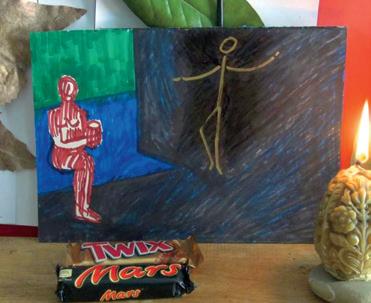
Living and Knowing You Are Alive (Être vivant et le savoir)
Alain Cavalier, France, 2019, 82 mins
Emmanuelle Bernheim and Alain Cavalier have been friends for 30 years, and are planning to collaborate on a film adaptation of Bernheim’s recent memoir recounting the story of her father’s search for an assisted death . In the film, Bernheim will portray herself, and Cavalier will play her father . However, things take an abrupt, tragic turn as Emmanuelle herself receives a terminal cancer diagnosis . Suddenly, the project’s focus changes .
Living and Knowing You Are Alive is a new chapter in Cavalier’s ongoing idiosyncratic personal diary, blending personal encounters with introspection, poetic fragments, and small, intimate rituals glimpsed in the secret garden of his workshop . The 87-year-old filmmaker documents his friendship with Bernheim through snapshots, notes and phone messages, and the film becomes an offbeat rumination on the end of a life, including a mock rehearsal of Cavalier’s own passing . The result is a joyful celebration of life and the time we have together . -TG
WORLD PREMIERE
Love, The Last Chapter
Dominique Keller, Canada, 2021, 78 mins
Is it ever too late to find love? In this portrait of life in a Calgary seniors’ home, we meet six residents who refuse to face the last chapter of life alone . As they struggle with declining health, limited mobility and dwindling finances, they find that the one thing they can rely on is the love they share with their new partners .
Director Dominique Keller embeds herself in the lives of her subjects, having moved into the seniors’ facility while making this film . Her dedication pays off in the intimate moments she is able to capture, a mark of the trust between filmmaker and subjects . We see not only the residents’ daily struggles but also their moments of shared joy . The film shows that even when life has taken so much else, it cannot take away our capacity for love . -JM

CANADIAN PREMIERE

Manzanar, Diverted: When Water Becomes Dust
Ann Kaneko, US, 2020, 77 mins
What do the water rights of Indigenous people in Southern California have to do with Manzanar, a World War II internment camp for Japanese Americans? American filmmaker Ann Kaneko expertly entwines these strands into a powerful story about the cultural and historical significance of water in the Owens Valley . The film connects the displacement of Indigenous people with the movement and imprisonment of Japanese Americans and the contemporary coalitions working to protect the disappearing ecosystem . Kaneko insists that these are all facets of the same story, while uncovering how official entities like the Los Angeles Department of Water and Power have made decisions regarding how the landscape should be used—and for whose benefit . Indigenous people who were relocated, Japanese Americans who were interned, park rangers and activists are all at work to reclaim this site and its histories, invoking the value of memory and storytelling in the quest for a sustainable future . This is an ambitious, elegant and evocative film that captures the beauty rooted in a dusty, contentious landscape . -KR
TRIPLE PLATINUM
Mimi
Claire Simon, France, 2003, 105 mins
More than just issue-driven films or talking head interviews, documentary can contain life, fix a sense of place, and in the case of Claire Simon’s film memoir Mimi, stop time . For Mimi Chiola, story is also a means of starting time all over again . On a warm sunny day in the seaside town of Nice, France, Mimi and her friend Claire walk and talk about her memories of the town . The sky is white and blue . You can virtually feel the heat, and smell the sea in the air . A natural-born raconteur, Mimi’s métier is memory . As she recounts how her father and mother first met (“Love at first sight, at age 42!”) or remembers her father’s death, or talks about her first encounter with her own sexuality, we listen and we see (and feel) the stories come to life . There is so much beauty in accidental details . Along the way, there are chance meetings, songs, and the occasional bit of dancing . -DW

TRIPLE PLATINUM

The Owl’s Legacy
Chris Marker, France, 1989, 80 mins
The legendary 13-part series, commissioned by Arte and the Onassis Foundation (which kept Marker’s work unavailable for 20 years), alights again at DOXA in its first three episodes: SYMPOSIUM or Accepted Ideas, OLYMPISM or Imaginary Greece, DEMOCRACY or The City of Dreams . Interviews were filmed in Tbilisi, Athens, Paris, Berkeley and Tokyo . The cast of characters is equally as expansive, with composers, filmmakers, philosophers and friends in the mix . But what is most startling are the ideas examined . Whether it is the Nazi appropriation of Ancient Greek gods and ideology, or George Steiner stating that “the Greek civilization enhanced the whole human race” but describing Socrates as “a royal pain in the ass .” Passions run high as the assembled minds debate and drink, talking about the foundational concepts of Western culture . Every interview is attended, perhaps witnessed, by the enigmatic gaze of a different owl—Minerva’s bird that looms large in the background . What is most curious, as with a great deal of Marker’s work, is the timeliness of his ideas and their respective focus . -DW
THIS SCREENING IS GENEROUSLY PROVIDED BY CINÉMATHÈQUE FRANÇAISE AND ARTE FRANCE.
CANADIAN PREMIERE
P .S . Burn This Letter Please
Michael Seligman and Jennifer Tiexiera, US, 2020, 101 mins
A long-buried box of letters penned by New York drag queens is opened in the modern era, revealing the 1950s—a time when the word “queer” was still very much a pejorative—as a glamorous but dangerous time to be gender non-conforming . To quote historian George Chauncey from the opening of the film: “Whenever you find a diary or a set of letters written by gay people themselves, it just opens up a world . ”
Through original interviews, unearthed archival footage and photographs, and stylized recreations, P.S. Burn This Letter Please investigates and rediscovers a world of mopping (stealing) clothes, wigs and jewels and calling it ‘camp .’ There is joy, heartbreak and truth in the testimonies of famous/infamous queens, now well into their 80s and 90s, who reflect on the days when they were both revered and reviled, even within the gay community . We can be glad that Reno, to whom the titular letters were addressed, did not burn them, and instead left them to be found . -JB


The Return: Life After ISIS
Alba Sotorra Clua, Spain/UK, 2021, 90 mins
Trapped—first by their alienated youth as Muslim girls living in minority enclaves within Western countries, then by ISIS and its ultra-radicalized doctrines that deprived them of agency, now as stateless individuals whose governments work to deny them as citizens . Alba Sotorra Clua’s stirring and sensitive film, filmed over the span of a year at the Roj Detention Camp in Northern Syria, immerses us in the stark stories of some of the world’s most notorious female ISIS “fighters .” With soft-spoken maturity, Shamima Begum, Hoda Muthana and others like them, including Canadian Kimberly Polman, speak for themselves, giving dramatic and sometimes grisly accounts of their experiences . In addition to fighting for their right to return home, they share the struggle of moving through overwhelming emotional and physical toil, as they wrestle with the guilt of their decision to join ISIS and hint at the work needed to rebuild a sense of identity and trust in humanity . -TA
WORLD PREMIERE
The Rumba Kings
Alan Brain, Peru, 2021, 94 mins
Since its inception in the 1940s, Congolese Rumba has invited its listeners to get on their feet, dance and feel joy . Brain’s film combines concert footage, interviews and archival images (featuring both fabulous fashions and infectious dance moves) to document the history of this melodic, magical style known as “the calling card of the Congo .” In a region better known for oppressive regimes, violently contested mineral wealth and the harsh colonial suppression of anything African, a group of Leopoldville musicians decided to build something unique . Reworking extremely popular Cuban songs, these sound alchemists added traditional elements and produced a new, repatriated, African form of jazz . Featuring intricate techniques and a unique three-guitar format, Congolese Rumba has shared stories of the working class and independence, and made its stars “bigger than the Beatles or the Rolling Stones” across the continent . The Rumba Kings is a stirring story of “a people who decided to fight oppression with music .” -TA


Seyran Ateş: Sex, Revolution and Islam
Nefise Özkal Lorentzen, Norway, 2020, 81 mins
“I’m not fighting against Islam . I’m fighting against patriarchy .” Seyran Ateş has spent her life dodging bullets and collecting death threats (including a fatwa or two) in her quest to bring about a more open-minded, 21st century version of her faith . Her message is clear: “Islam needs a sexual revolution .” Nefise Özkal Lorentzen’s film skillfully winds history and Ateş’s work into a cohesive whole as vibrant and articulate as the woman herself, taking us from Ateş’s childhood in the “slums” of Istanbul, through her family’s immigration to Germany in the 1970s, to her ongoing advocacy as the founder/Imam of a Berlin mosque and worldtravelling human rights activist . Despite Ateş’s repeated and defiant refrain, “Why do you want to kill me?”, the film’s takeaway is inspiring optimism from a dedicated humanitarian . -TA
SELF STUDY
Silent Voice
Reka Valerik, France/Belgium, 2020, 51 mins
Khavaj, an MMA (mixed martial arts) fighter from Chechnya, is on the run from his family, his country and himself . His homosexuality assures his death back home, while the threat of persecution and the shock of exile have caused Khavaj to go mute . Now in Belgium, Khavaj lives his life alone and underground, moving from hotel to hotel and linked to his homeland only through audio messages sent by his mother . Reka Valerik’s film follows Khavaj as he lives in the shadows, training only in secret with a friend . As Khavaj struggles to regain his voice, he must battle with his own identity and confront the pain of his exile to survive . -KE


Sisters with Transistors
Lisa Rovner, UK, 2020, 90 mins
A thorough and concise account of women in electronic music, from Clara Rockmore’s experiments with the theremin in the early 20th century, to the BBC Radiophonic Workshop of Delia Derbyshire (famous for the Doctor Who theme) and synthesizer masterminds Laurie Spiegel and Suzanne Ciani in the 1970s . The film investigates the vanguards of electronic music who were making weird sounds, composing film scores and coaxing dreamy drones from unusual sources . They developed innovative methods and machinery, including giant tape loops, early synthesizers and computer software .
For these women who felt marginalized and patronized in the traditional music hierarchy, electronic music offered a space where they were free to innovate and able to make a mark . Though they have been hugely influential in their fields, the work of people like Daphne Oram and Pauline Oliveros is largely unknown outside niche circles . Whether you are already an electronic music aficionado or totally new to the genre, Sisters with Transistors is an absorbing, fascinating and satisfying study . -TA
PRECEDED BY THE SHORT FILM
Space Lady (pg 86)
TRIPLE PLATINUM
Six Portraits XL: No . 2 Jacquotte and Daniel
Alain Cavalier, France, 2017, 104 mins
“Inanimate things, might you have a soul that bonds to our soul and forces it to love,” wrote Lamartine . In the untouched bourgeois house invaded by swallows and dust, Jacquotte wanders through her childhood . The old wallpaper crumbles . Toys, paintings, stuffed animals, clothes and old umbrellas—how could she ever throw away all this memorabilia? Year after year, she takes inventory and saves her past until it is “saved for eternity .”
In his small apartment, an old bachelor named Daniel talks frankly with an uncomplaining humour about the difficulties in his life, his erratic romances with street girls and his hope to repeat the 20,000 euros he once won . “Unhappy in love, happy in games,” he says . As the years go by, he hides nothing from Cavalier’s camera including his invasive OCD rituals of cleanliness and security . Sometimes he feels he is on the verge of losing it, but somehow he copes . -TG
THIS SCREENING IS GENEROUSLY PROVIDED BY INSTITUT FRANÇAIS.

Ahmir “Questlove” Thompson, US, 2021, 120 mins
Directed by Ahmir “Questlove” Thompson, Summer of Soul (...Or, When The Revolution Could Not Be Televised) is a vibrant archival music documentary chronicling the 1969 Harlem Cultural Festival, a hugely popular series of outdoor concerts held in Harlem the same summer as Woodstock . Featuring riveting footage of never-before-seen performances by the leading Black artists of the age—Nina Simone, Stevie Wonder, B .B . King, Gladys Knight, and more—Questlove’s film is nothing short of a sociopolitical love letter to Black music and movement . As an act of restoration and reclamation, Summer of Soul is an unapologetic tribute to Black artistry on the heels of a decade of civil rights and civil losses .
“It’s a music documentary like no other, because while it’s a joyful, cataclysmic, and soulfully seductive concert movie, what it’s really about is a key turning point in Black life in America.” - VARIETY
GRAND JURY PRIZE 2021 SUNDANCE FILM FESTIVAL
AUDIENCE AWARD 2021 SUNDANCE FILM FESTIVAL

Tell Them We Were Here
Keelan Williams and Griff Williams, US, 2021, 88 mins
San Francisco was arguably the countercultural epicentre of the latter part of the 20th century—a refuge for artists and weirdos, a place where political activism proliferated, a city in which to live and make art free of commercial pressures . Tell Them We Were Here traces the throughline of that history into the 21st century, probing the artistic practices of seven notable Bay Area artists . Each is interested in challenging the transactional value of art, and all seem to be more interested in a life, rather than a career, in the arts . These artists have developed art practices that directly benefit their communities and centre ideas of civic responsibility, social activism and healing divisions of inequality in spite of the Bay Area’s increasingly unequal and unaffordable realities . Featured artists include Sadie Barnette, Amy Franceschini, Jim Goldberg, Lynn Hershman Leeson, Alicia McCarthy, Tucker Nichols, Nigel Poor and Michael Swaine . -NC
CANADIAN PREMIERE

There Will Be No More Night
Éléonore Weber, France, 2020, 76 mins
“While they are flying, everything the pilots watch is being filmed .” In There Will Be No More Night, video images captured by American and French armed forces surveil conflict zones in Afghanistan, Iraq and Syria through the unblinking eye of a military camera . These stark, startling images are enhanced by the words of an anonymous pilot and terse, precise narration exploring how “the imbalance of the forces is irrevocable . ”
“Once you start shooting, it is difficult to stop,” the pilot admits, a witness to moments of horror and anxiety relayed by the grainy video feed . The film grapples with the near-limitless potential of surveillance as a tool of war, using thermal cameras to coldly observe gruesome scenes of alleged insurgents being gunned down in pitch dark, alongside images of children playing in an Afghani village . The effect is a chilling look into the unchecked power of modern war . -CN
YOUNG JURY AWARD + SPECIAL MENTION 2020 CINÉMA DU RÉEL
AUDIENCE AWARD 2020 DOCUDAYS

Through the Night
Loira Limbal, US, 2020, 72 mins
The many dimensions of care work intersect in Loira Limbal’s film, an inspiring window into the world of working mothers . Using a mix of observation and personal narrative, Through the Night drops us smack into the centre of the US child-care crisis, immersing us in the goings-on of one 24-hour daycare and the work of its extraordinary proprietor, Delores “Nunu” Hogan . With the help of her husband Patrick (“Pop Pop”), Nunu has spent over two decades caring for the children of working parents—and often caring for the parents themselves . Producer/director Loira Limbal’s patient and multi-layered film not only confirms what it looks like to give kids the solid foundation they need to grow and thrive, but deftly outlines the ways in which harsh economic and labour policies are currently hindering, not helping, working class mothers . -TA
THIS SCREENING IS PART OF A SPECIAL INDUSTRY EVENT. MORE ON PAGE 18.

‘Til Kingdom Come
Maya Zinshtein, Israel/UK/Norway, 2020, 76 mins
“A strategic partnership of God” is how Yael Eckstein, leader of the International Fellowship of Christians and Jews, describes the curious alliance forged in 1983 between the American Jewish and evangelical Christian communities . Her organization has become Israel’s foremost philanthropic group by appealing to Christians through an emphasis on the critical role Jews will play in Jesus’s return, and Maya Zinshtein’s film focuses on the financial, political and messianic objectives of this partnership, as well the inherent clashes in ideology that threaten to undo it .
From evangelical constituents praying for the State of Israel in an impoverished coal mining town in Kentucky to the halls of power in Washington and Israel, the film reflects on the alarming moves the Trump and Netanyahu administrations have made in recent years, including the relocation the American Embassy to Jerusalem and continued annexation of the West Bank . What is revealed is an apocalyptic worldview reshaping American foreign policy toward Israel and the Middle East . -TA
THIS SCREENING IS PART OF A SPECIAL INDUSTRY EVENT. MORE ON PAGE 18.

Wuhan Wuhan
Yung Chang, US, 2021, 90 mins
Wuhan Wuhan is a deeply compassionate portrayal of the early days of COVID-19 . Despite shuttered shops, eerily empty streets and deserted public spaces, the city of Wuhan still teems with stories . Chinese-Canadian filmmaker Yung Chang (director of the award-winning Up the Yangtze) follows optimistic essential workers whose personalities shine through layers of PPE .
The film focuses on a handful of characters: Zhang is a psychologist who traveled to Wuhan to help quarantined patients and overtaxed medical workers deal with stress, grief and anger; Yin is a gentle father-to-be who can’t bear being cooped up, and so has volunteered to drive medical staff where they need to go; Zheng keeps a sense of humour while running a fast-paced emergency room; nurse Susu cries when her job necessitates the cutting of her hair, and tries to comfort her children from afar; and Lailai and Mama Liu long to leave their sterile, makeshift quarantine centre .
Yung Chang’s intimate access to medical workers, patients and hospitals during the lockdown, along with his empathetic eye for detail, creates insight that transcends the confusion and loneliness of isolation, revealing a tenacious spirit of togetherness . Wuhan Wuhan is restrained, meditative, beautiful and alienating all at the same time, and lands with immense emotional impact . -KR

SELF STUDY

You Are Not a Soldier
Maria Carolina Telles, Brazil, 2021, 110 mins
As filmmaker Maria Carolina Telles comes to terms with the death of her father, a man who regretted never making it to the frontlines of World War II, she focuses her lens on the life of another man who had his own unique experience as a civilian in the midst of combat: award-winning war photographer André Liohn .
Telles’s film captures Liohn as he navigates fatherhood alongside the intense turmoil that comes with his profession, with much of the story told in first-person through Liohn’s own lens—on the frontlines of the Libyan Civil War and in ISIS-occupied Mosul, as well as with his children in Italy and his hometown of Botucatu, Brazil . As Liohn explores his children’s understanding of his job, he also attempts to come to terms with the work himself: What does it mean to be in the midst of a war zone by his own choosing? The film explores the modern ethics of war journalism, pondering whether Liohn is unafraid of death or simply putting his life at risk as a way to be remembered . -NC
SELF STUDY
Your Mother’s Comfort
Adam Golub, Brazil/US, 2020, 75 mins
Indianara Siqueira is an unapologetic transgender whore (self-proclaimed), a farleft activist, a housemother to dozens of trans sex workers at the NEM (“neither/ nor”) homeless shelter, and a motivational example of thousands of occupied squats in Rio de Janeiro . Your Mother’s Comfort follows as Indianara runs for city council in 2016 (losing by 300 votes), leads in the occupation of a building to provide housing and a safe place for disadvantaged neighbours, and anxiously watches along with her fellow NEMers as the hateful Jair Bolsonaro ascends to the top of the Brazilian political scene in 2018 .
She may seem a force of nature, but Indianara is also human, and Golub’s film explores his subject as she drinks, reflects on past sexual encounters, and succumbs to exhaustion as the new president is sworn in . Politically defeated but alive to fight another day, her’s is a spark that could once again become a flame . What a woman! -KE
COUSINS AND KIN
COUSIN SHOWCASE

Bocamina (Pithole)
Miguel Hilari, Bolivia, 2019, 22 mins
We see: Potosí, a colonial mining town, stationed near a mountain of silver ore . At the pithole, the faces of workers leaving the mine, which become still images observed by the town’s youth—images of the people, the land and the past, intertwined and in flux .

Giizis Mookaam Giiwe
Eve-Lauryn LaFountain, US, 2016, 13 mins
This film is a smudging ceremony, animating the rising and setting of the moon and the sun, in reverence to planetary, urban and earthly cycles . Originally made on 16mm color film, LaFountain’s piece collapses time, space and sound to create a singular meditative experience .

San Diego
Fox Maxy, Ipai Kumeyaay/Payomkawichum US, 2020, 33 mins
Stitching together homegrown video footage with social media screen captures, archival material, club music and field recordings, this experimental piece explores anti-colonial resistance and the complexities of engaging in cultural practice under the strictures of quarantine . The enchantment of sound and colour pervades each assembled moment . -EM
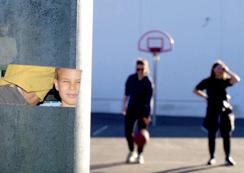
We Only Answer Our Land Line
Woodrow Hunt and Olivia Camfield, US, 2019, 6 mins
An experimental essay film exploring the non-linearity of Indigenous experience and the material specificity of digital video to resist the violence of settler colonialism by following the lead of the film’s central character, the Alien .
COUSINS AND KIN
WHAT WAS ALWAYS YOURS AND NEVER LOST

Creatura Dada
Caroline Monnet, Canada, 2016, 4 mins
Six powerful Native women, depicted in luxurious closeups, share an extravagant feast . Together, they celebrate a new beginning and the end of the world as we know it .

Gephyrophobia
Caroline Monnet, Canada, 2012, 3 mins
The word gephyrophobia means “fear of bridges .” An ominous soundtrack accompanies 16mm monochrome shots depicting the dépanneurs, byways and bridges of Ottawa/Gatineau—cities for whom the shared river and its crossings are ever-present motifs of intractable cultural contradictions . -EM
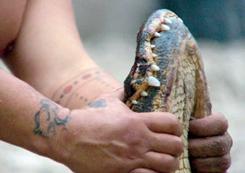
Halpate
Adam Khalil and Adam Piron, US, 2020, 14 mins
Considered a staple of Florida tourism, alligator wrestling has been performed by members of the Seminole Tribe for over a century . Halpate profiles the hazards and history of the spectacle through the words of the tribe’s alligator wrestlers themselves, and reflects on what it has meant to their people’s survival .
IMAGE COURTESY OF VIDEO DATA BANK AT THE SCHOOL OF THE ART INSTITUTE OF CHICAGO
The History of the Luiseño People
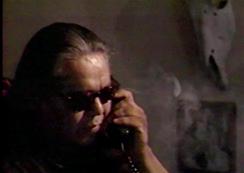
James Luna, US, 1993, 27 mins
Based on his ever-changing performance Indian Tails, this film features Luna sitting alone in his darkened room in front of the TV on Christmas Eve . As he sits, he calls friends, family and ex-lovers, excusing himself from all of their celebrations .

Impressions For a Sound and Light Machine (Impresiones para una máquina de luz y sonido)
Colectivo Los Ingrávidos, Mexico, 2017, 7 mins
A woman raises her voice to deliver a painful, endless speech that becomes increasingly overwhelming as time goes on . Her words are heartbreaking and permanent impressions in the collective memory, words that stab at an old Mexican celluloid print that tears and disappears .

Itzcóatl
Colectivo Los Ingrávidos, Mexico, 2016, 5 mins
The scales of the snake refract and bend, commanding a trance-like attention . At the film’s epicentre, the pyramids join Itzcóatl’s battle while the Obsidian Serpent cultivates the emphatic call that all dances must move against the war .

Just Dandy
Thirza Cuthand, Canada, 2013, 8 mins
Invited to speak at an Indigenous Revolutionary Meeting, the narrator describes an intimate encounter with an Evil Colonizing Queen that leads to Turtle Island’s contraction of an invasive European flora .

Less Lethal Fetishes
Thirza Cuthand, Canada, 2015, 10 mins
Not a sex video, but maybe a sexy video? About a latent gas mask fetish, but maybe actually about a certain art world tear gas controversy the filmmaker was involved in? But also about Chemical Valley in Southern Ontario? A pretty film, about weird shit .

Mobilize
Caroline Monnet, Canada, 2015, 3 mins
Guided by those who live on the land and driven by the pulse of the natural world, this film reframes archival NFB footage to carry us from the far north to the urban south . Over these landscapes, Monnet captures the perpetual negotiation between the traditional and the modern by a people moving ever forward .
Reel 2 Real International Film Festival for Youth
April 14 - 23, 2021 | r2rfestival.org
The Vancouver Queer Film Festival
August 12 - 22, 2021 | queerfilmfestival.ca
The Reel 2 Real International Film Festival for Youth (R2R) will be online from April 14 thru 23. With a household pass, the whole family can enjoy documentaries, animation, and dramas from Canada and around the world. Elementary and high school teachers can purchase a pass to watch films in their classrooms; educational materials are included, as media literacy is more important than ever. R2R’s diverse, imaginative, and inspiring films foster empathy, understanding, and a nuanced view of the world. The Vancouver Queer Film Festival is a vibrant space for queer arts, culture, and community. It showcases dynamic and thought-provoking films from British Columbian filmmakers as well as other Canadian and international directors and storytellers. As Western Canada’s largest queer arts event, the Festival curates films which contextualize and celebrate queer lives and experiences, and prioritizes foregrounding diverse identities in our communities, including narratives from trans people, queer people of colour, and Indigenous people.

Vancouver Latin American Film Festival
August 26 - September 5, 2021 | vlaff.org
When you like something, you should do it all night long. ― Chavela Vargas VLAFF invites you to join us for our 19th year throughout 2021 for some dynamic online programming and our hybrid festival in August. Featuring 70+ films from all over Canada, Latin America and the Caribbean, spoken in over nineteen different languages (always with English subtitles), along with artist talks, panel discussions, interactive virtual events, and (we hope) a REAL party or two. Have a wonderful time at DOXA and see you soon!
The Vancouver International Film Festival

September 30 - October 10, 2021 | viff.org
VIFF’s 40th edition will take place from September 30 - October 10, 2021. The landmark edition will feature both in-cinema and online screenings, with approximately 100 features and 100 shorts to be screened in a showcase of exceptional films from around the world. Happy Anniversary Doxa! In celebration of Doxa’s 20th year of championing exceptional documentary cinema, VIFF is offering DOXA fans a $20 discount on a VIFF+ Silver or Gold Membership. Get yours today with the code ‘VIFFDOXA20’ and enjoy streaming, in-cinema and festival discounts, plus free access to VIFF curated cinema and talks from the comfort of your home all year. See what’s on now at viff.org.

DRIVE-IN!
PACIFIC NATIONAL EXHIBITION (PNE) AMPHITHEATRE
• THURSDAY, MAY 13 • 5:30PM Dead Man’s Switch: a crypto mystery
9:00PM The Gig is Up
• FRIDAY, MAY 14 • 5:30PM Someone Like Me
9:00PM Kímmapiiyipitssini: The Meaning of Empathy
• SATURDAY, MAY 15 • 1:00PM In the Rumbling Belly of Motherland
5:30PM FANNY: The Right to Rock
9:00PM Poly Styrene: I Am A Cliché
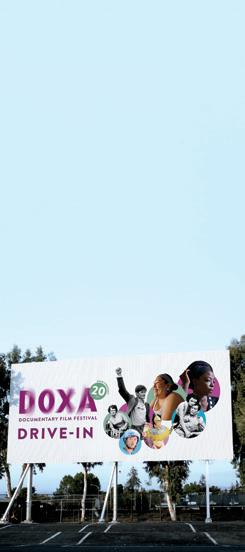
MORE DETAILS ON PAGE 21
SHIFTING HISTORY
From divisive Tunisian politics and radical Cuban media to Colombian national narratives, this assemblage of short films grapples with our collective notions of history, as well as the ever-permeating nature of social and political change.

Ain’t No Time For Women
Sarra El Abed, Canada, 2020, 19 mins
A group of women gather at Saïda’s, a hairdresser, on the eve of Tunisia’s 2019 presidential election . The camera is a fly on the wall in Sarra El Abed’s whimsical film, as the salon transforms into a town square, offering an intimate look at the country’s burgeoning democracy .

At Its Own Rhythm
Jorge Ayala-Isaza, Canada, 2019, 20 mins
At Its Own Rhythm (A su propio ritmo) lifts the curtain on a relatively unknown audiovisual archive chronicling the early years and struggles of the Cuban Revolution: the Noticiero ICAIC Latinoamericano (ICAIC Latin American Newsreel) . Pairing politically charged visuals with an eclectic soundtrack, Jorge Ayala-Isaza’s film asserts Cuba’s vital role in reshaping the iconography of one of the 20th century’s most revolutionary movements .

Bicentenario
Pablo Alvarez Mesa, Canada, 2020, 40 mins
Two hundred years after Simón Bolívar’s liberation journey across Colombia, Bicentenario reflects on the Liberator’s spirit and legacy, kept alive through social rituals of remembrance and mired by political mysticism, doctrine and a curse that has fixed itself in the collective imagination of an entire continent . Summoning Bolívar’s spirit to the exact sites that witnessed the battles, it is this curse that Bicentenario seeks to invoke and, perhaps, exorcise .
FAMILY IN FOCUS
Family is the underlying thread in this collection of short films. From reflections of Bill Reid’s granddaughter to the closing of a family restaurant in Campbell River, as well as issues of gender identity, caregiving and immigration in the time of COVID-19, these five stories explore plural meanings of home, family and legacy.

A Golden Voice
Patrick Shannon and Jenn Strom, Canada, 2020, 6 mins
Over 20 years have passed since the work of Bill Reid has been explored on film . Patrick Shannon and Jenn Strom’s A Golden Voice is an imaginative take on the origin story of one of Turtle Island’s most iconic Haida artists .

Homegoing
Yeon Park, US, 2021, 18 mins
In the United States, permanent residency applications were temporarily suspended during COVID-19 lockdowns . Yeon Park’s portrait film quietly observes a South Korean couple’s struggle to define where home is as they await their Green Cards .
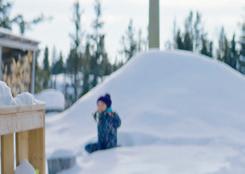

Into Light
Sheona McDonald, Canada, 2020, 19 mins
In Sheona McDonald’s gorgeous film, a mother and child in Yellowknife navigate the complexities of gender identity . Capturing the duo’s journey to acceptance, authenticity and allyship, Into Light ultimately asks, “When a child reveals who they truly are on the inside, how does a parent set aside their own expectations to help them become their most authentic self?”

Kalinga (Care)
Kent Donguines, Canada, 2020, 29 mins
At the age of six, director Kent Donguines’s mother left him and his family to become a nanny . Years later, his film Kalinga (Care) shares the stories of several Filipina caregivers and nannies in Vancouver, bearing witness to their sacrifices as they struggle to reunite with their children and families .
WORLD PREMIERE
Koto: The Last Service
Joella Cabalu, Canada, 2021, 15 mins
After nearly 40 years, the family-run Koto Japanese Restaurant in Campbell River is closing down . Run by the Maeda family, the Koto is known for being one of the first authentic Japanese restaurants in the “Salmon Capital of the World .” Set during its final business days, Joella Cabalu’s film is a meditation on graceful goodbyes and the legacy of investing care and attention in relationships through sushi .
HOMETOWN BANTER
In this lineup of short films, we feature the bold, the quirky and the downright peculiar. Behold a flock of rogue local roosters, a problematic favourite restaurant in North Vancouver, the oldest nudist club in Canada (also in North Van?!), two celebrity grandmas, and a very small town struggling to capitalize on its most famous native: Madonna.

WORLD PREMIERE
Free Range
Daniel Jeffery, Canada, 2020, 15 mins
The Jeffery family, though not farmers by trade, must rid their chicken coop of four brutish roosters . BC director Daniel Jeffery’s hilarious Free Range chronicles a daylong misadventure to 100 Mile House, where the family—and the roosters—don’t quite end up at the butchery .

Gramma & Ginga: The Movie
Jennifer Steinman Sternin, US, 2020, 31 mins
Genevieve “Gramma” Musci and her sister Arlena “Ginga” Bashnett once lived a simple life . But at ages 104 and 99 respectively, the beloved sisters have suddenly become a viral sensation, with videos of their incessant bickering and comedic insight catching the attention of millions of people worldwide .


Nude to Me
Danny Berish, Canada, 2021, 20 mins
When local filmmaker Danny Berish learns that his grandmother found love at a nudist camp, he sets off to explore his family history, which leads him to Canada’s oldest nudist club, Van Tan . Nude to Me is a charming plunge into naturism that ultimately asks, “What does it take to dare to go bare?”
WORLD PREMIERE
Smelly Little Town
Zach Neumeyer, US, 2020, 26 mins
When Madonna described her birthplace as a “little smelly town” on national television in 1987, local media turned public opinion against her . But as the town falls on hard times, Zach Neumeyer’s Smelly Little Town details one rust belt city’s indecision over whether to capitalize on the celebrity of its most famous native .

The Tomahawk
Lyana Patrick, Canada, 2020, 3 mins
The fine line between kitsch and racism is examined in Lyana Patrick’s film about The Tomahawk, the oldest family-run restaurant in British Columbia .
RATED Y FOR YOUTH
From local skateparks and protests to deportations and endangered language preservation, this collection of short films explores the personal and collective reckonings of people working towards environmental change, immigration justice and Indigenous resilience.
RECKONINGS

Ale Libre
Maya Micaela Cueva, US, 2020, 17 mins
Alejandra Pablo, a criminalized community organizer and unapologetic immigrant, is preparing for the biggest moment in her life—her deportation case . As her court date nears, this film follows Alejandra in her work for immigration and reproductive justice, all the while reckoning with a system threatening to tear her family apart .

Inuit Languages in the 21st Century
Ulivia Uviluk, Canada, 2019, 10 mins
What does language preservation look like in the digital age? True to form, young Inuit director Ulivia Ulivuk’s multimedia film explores the possibilities the internet offers for Inuktitut, a complex language currently under threat . Ulivuk asks, “Are there solutions so that these technologies are allies and not enemies?”

Joe Buffalo
Amar Chebib, Canada, 2021, 16 mins
Joe Buffalo is an Indigenous skateboard legend . He’s also a residential school survivor . As he emerges from a traumatic childhood and decades of addiction, local director Amar Chebib presents an intimate portrait of Joe’s journey to fulfill his lifelong dream of turning pro .

What About Our Future?
Jaime Leigh Gianopoulos and Cláudio Cruz, Canada, 2020, 24 mins
“We are unstoppable, another world is possible!” chant the Sustainabiliteens, a group of young environmental activists who, in 2019, organized the largest climate strike in Vancouver’s history . What About Our Future? chronicles the everyday lives of these youth leaders as they organize, mobilize and pressurize for climate justice .

MATERIAL OF MEMORY
Some choose therapy to process grief; others make movies. In this collection of short films, four filmmakers take to the camera to explore, frame by frame, the loss of youth, of friends, of siblings and parents and, for one Italian village, of life as it once was.


Burnt . Land of Fire
Ben Donateo, Switzerland, 2020, 15 mins
Ben Donateo’s exquisite film is a slow portrait of Filippa di Mesoraca, a village in southern Italy’s Calabria region . Hit by the migration of its youth to the north, Burnt. Land of Fire captures what’s left of the village’s land, homes and residents .
CANADIAN PREMIERE
The Love and Death of Yosef and Zilli
Dean Gold, Canada, 2020, 19 mins
After 62 years of marriage, Yosef and Zilli decide to take their own lives together . Dean Gold’s gentle film brings to life the memories of their love and premeditated deaths through the videotapes of their youngest son, Doron .


Still Processing
Sophy Romvari, Canada, 2020, 16 mins
At the centre of Sophy Romvari’s film is a box of family photos, stowed away and unseen for decades . As these photos come into view for the first time, so too do Sophy’s lost memories . “I’m still not sure if it’s finished,” Sophy silently narrates, indicating that when it comes to matters of loss and grief, no one ever truly stops processing .
NORTH AMERICAN PREMIERE
You are always 20
Christer Wahlberg, Sweden, 2020, 15 mins
Cut entirely from an old feature film made by himself and his best friend at age 19, director Christer Wahlberg’s You are always 20 is a trip down memory lane as well as a personal reckoning with grief, loss and friendship .

TRIPLE PLATINUM
SIX MILES DEEP

Six Miles Deep
Sara Roque, Canada, 2009, 43 mins
In February of 2006, members of the Iroquois Confederacy (the Haudenosaunee) set up a blockade near Caledonia, Ontario to stop a housing development on traditional land . Despite the media’s attendance at the time, minimal attention has ever been given to the Indigenous land protectors who were involved in the confrontation, and in particular to the crucial role played by the women of the Six Nations tribes, who stood their ground even as community chiefs asked their people to abandon the cause . Roque aims to remedy this exclusion, highlighting the role the clan mothers played in fortifying their people’s resolve, and her film is a stirring portrait of a group of women whose actions led to a cultural reawakening within their community . -KA

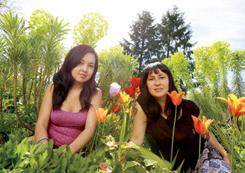
Indigenous Plant Diva
Kamala Todd, Canada, 2008, 9 mins
Artist, ethnobotanist, educator and activist Cease Wyss understands the healing powers of the plants that grow in downtown Vancouver, and passes on this ageless wisdom and unspoken language to her daughter, Senaqwila . -KA

Still Here
JB The First Lady and Toni Lavallie, Canada, 2018, 6 mins
Hip-hop artist, activist and educator Jerilynn Webster (JB The First Lady) describes her music as political and positive . Amidst the powerful emotions evoked in her music video Still Here, love is strong . -KA
WITH FEATURES

Space Lady
Sophia Feuer, US, 2020, 17 mins
After 30 years of homelessness and busking, 71-yearold musician Susan Schneider (otherwise known as “The Space Lady”) is beginning to receive notoriety for her early contributions to electronic pop music, largely thanks to online word of mouth . Sophia Feuer’s film brings to light sensory, observational details from The Space Lady’s present life in rural Colorado—namely, her struggle to reclaim the music from the pain that encompasses it—while reflecting on her past .
THIS FILM WILL PRECEDE THE FEATURE FILM, SISTERS WITH TRANSISTORS (p. 72)
CANADIAN PREMIERE
Sacred Brick Technology
Ian Bertorelli, US, 2020, 15 mins
From city, to block, to building, to brick: Sacred Brick Technology invites the viewer to take a novel look at the familiar yet often unnoticed masonry unit . Exploring concepts of individual identity and magnitudes of scale in urban environments, Ian Bertorelli’s film follows the brick from its beginnings at the dawn of civilization to its role in building Chicago—a staggering metropolis constructed almost entirely out of the very earth on which it stands .




